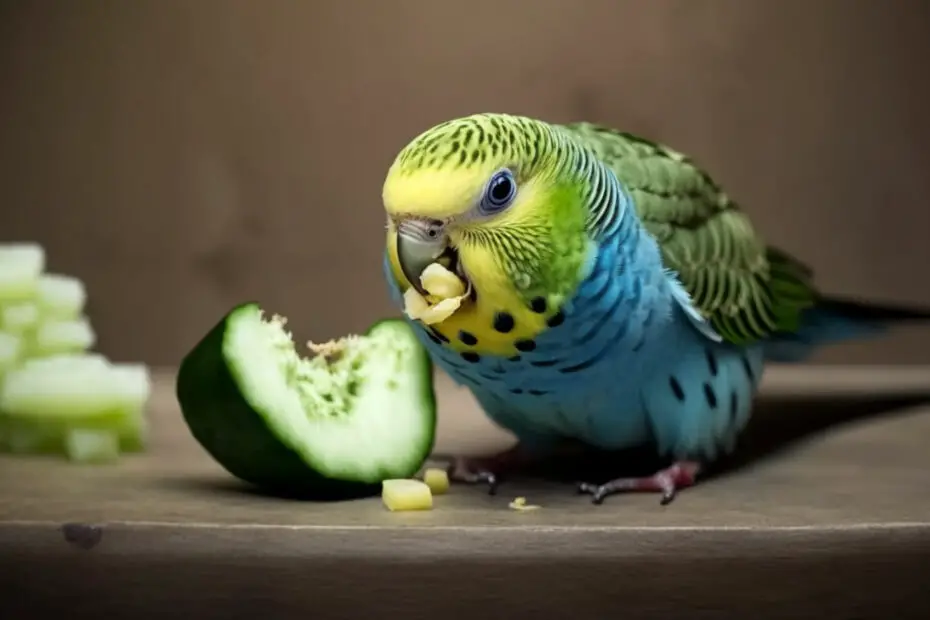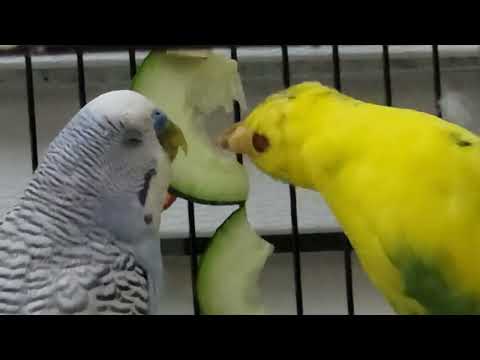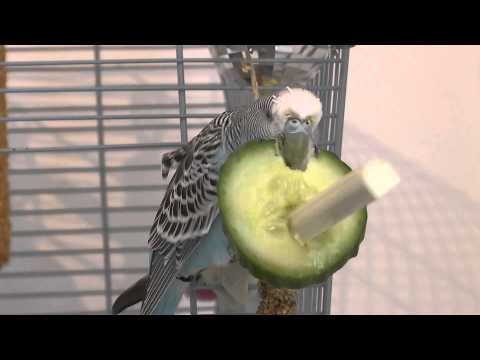Budgies are vegans! But that doesn’t mean you should feed them with every veggie you can think of. Some are unsafe, and you shouldn’t give them to avoid subjecting their sensitive body system to unnecessary suffering and health problems. But is cucumber a safe veggie to feed to your budgies?
Can budgies eat cucumber? Yes, cucumber is a safe vegetable for the budgerigars to eat. The birds can eat the flesh and the skin of the cucumber. It is packed with important nutrients that promote your feathered friend’s immunity, feather growth, and overall healthy development. However, you should feed it to them as an occasional treat and not in an everyday budgie diet plan.
Before you start feeding your little feather friends cucumbers, read this post for more info on how to prepare them, what parts of cucumbers to give them, how often to feed them, and more.
Can you feed cucumber to budgies?
Absolutely yes! Cucumbers are one of the safe vegetables you can feed to your birds without worrying about something bad happening to them.
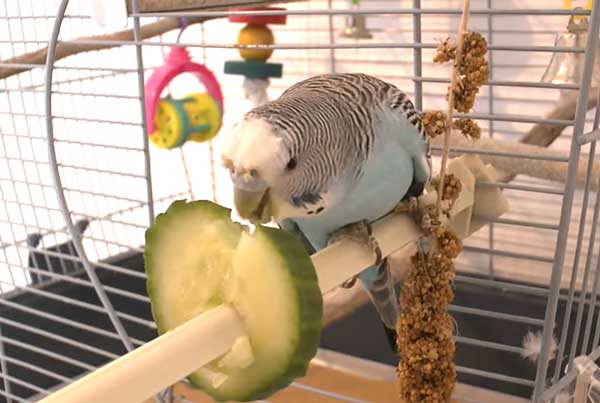
They’re an ideal treat for your bird occasionally or as part of a balanced diet for the birds that comprise fruit, vegetables, and seeds.
The vegetable is packed with multiple nutrients (minerals and vitamins) that are beneficial to the bird’s overall good health (more details about the health benefits of cucumbers for budgies coming up later in the post—keep that tab open!)
However, you shouldn’t feed cucumbers to your birds every day. This is because they carry a lot of water, and providing them to your birds daily will cause them to make runny droppings.
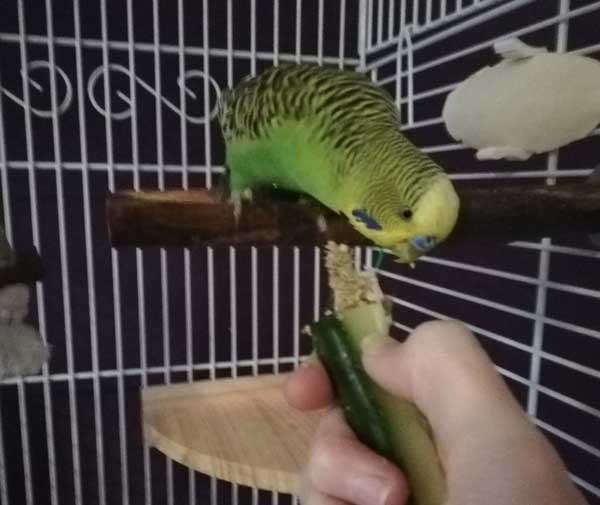
These can risk dehydrating the bird’s body, which isn’t good. More details on how many cucumbers to feed your budgies are coming up in this article.
Do Budgies Like cucumber?
Although cucumbers are safe for budgies, not all budgies may be excited about them. Or in other words, not every budgerigar is always ready to try new things.
We humans also have our preferences, so it’s pretty easy to understand these cute little birds.
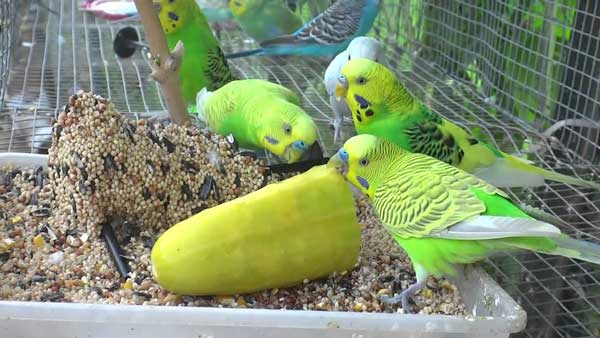
That said, if you introduce cucumber to your birds and they don’t show a positive response to it, you shouldn’t give up on them. Go slow on it and try introducing it the next day.
If your budgies seem to be scared by the cucumber after you throw it in their cage, just remove it and try giving it to them the next day.
Still at it, you can try hand-feeding the birds the new veggie and see how they respond to it.
But never rush the birds into eating the new veggie; let them move at their own pace! Let them try it in their own time.
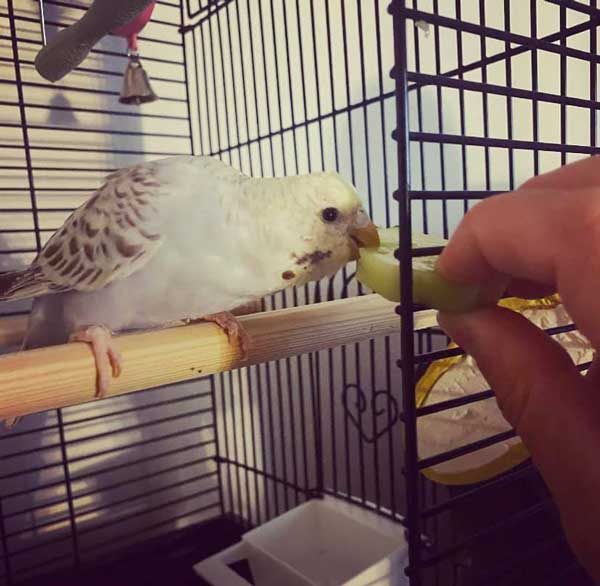
Health Benefits of cucumber to Budgies
The cucumber has a high nutritional value for the budgies. It provides the little feather friend with plenty of essential vitamins and minerals they need for a healthy body. Let’s look at the key health benefits your birds will get from cucumbers.
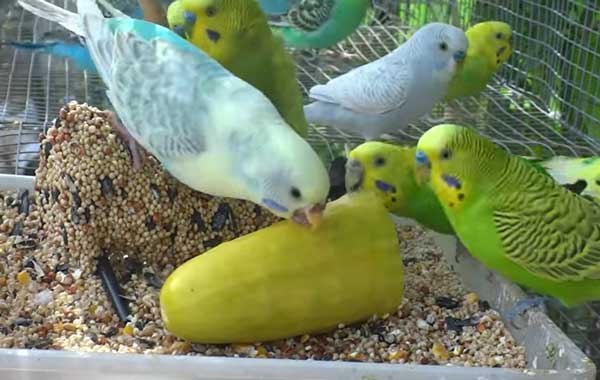
They contain enough silicic acid
It is a well-known fact that cucumbers contain silicic acid. For starters, silicic acid is simply silica, better known as a beauty mineral.
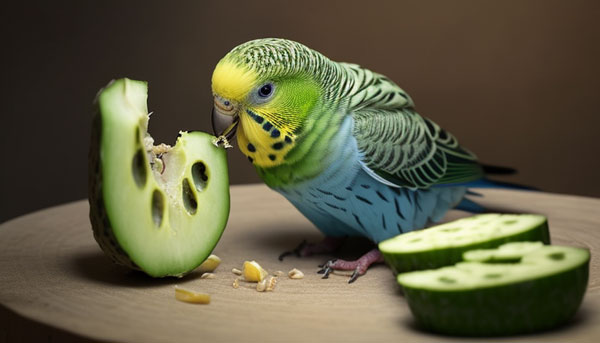
This acid is known to promote the development of beautiful fathers in your birds. And this makes cucumbers a good treat for making your birds look beautiful all year round!
They’re packed with vitamins and minerals
As we hinted earlier, cucumbers also contain plenty of vitamins that help keep your bird healthy. To be precise, they feature vitamins A, C, and K.
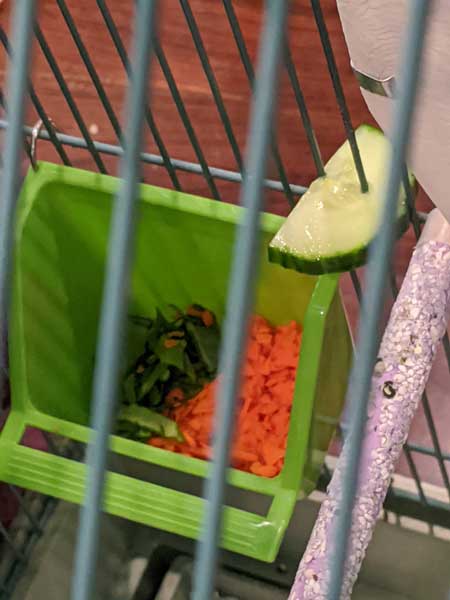
They also contain minerals, magnesium, and potassium. This means the vegetable has the vital vitamins and minerals a budgie needs for a healthy body and a loving life.
Plenty of water (keep your budgies well hydrated)
Probably the reason why cucumbers are more popular even for human consumption is that they contain high water content.
This further makes it a great treat to help keep your feathered buddies well-hydrated, contributing to beautiful and colorful feathers.
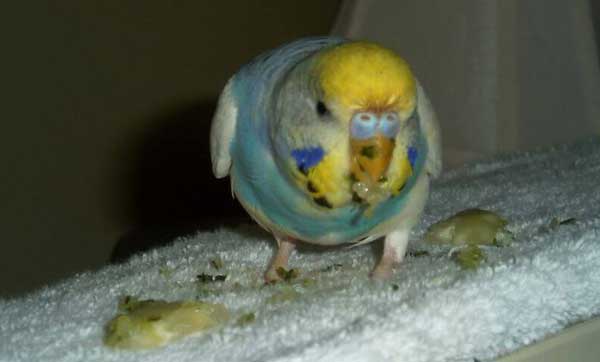
Cucumber will also be a healthy treat for your budgie when they need to keep hydrated and cool in hot weather.
However, don’t feed too many cucumbers to your budgies as this can result in a watery/squidgy stool, which ends up hydrating them (as explained in our next section).
How many cucumbers should budgies eat?
They say too much of anything is poisonous. The same applies to feeding cucumbers to your budgies. Feeding unlimited pieces of cucumber to your birds can be bad for them.
One well-known side effect of your birds eating too much cucumber is running droppings. This is because cucumbers are well-packed with water. Taking in too much water is unhealthy for budgies as they can easily dehydrate due to too many runny droppings.
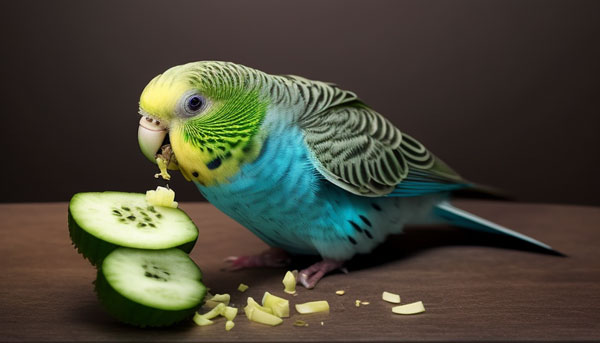
The last thing you want for your parakeets is to dehydrate! They can’t survive for long if they lack enough water in their bodies.
That said, you should feed them with this vegetable moderately. Give them a couple of times a week as a treat. You should also feed them just a few slices to avoid overfeeding and its side effects.
In general, experts recommend that vegetables should make up about 20% of your budgie’s diet. This way, your cute little birds will enjoy all the health benefits offered by this vegetable without suffering the side effects.
How do you prepare cucumbers for budgies?
Now that we have already said that cucumbers are safe and healthy for budgies, you may wonder how best to prepare them for the birds to enjoy eating them and gain all their health benefits.
Well, there are no complicated recipes for preparing cucumbers for budgies. You just need to observe a few things, and you’re all good.
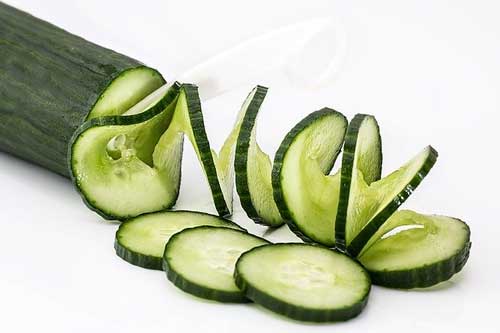
First, you should try as much as possible to feed your birds with organic cucumber. This is because organic vegetables are not grown using pesticides, making them an even safer bet for your birds.
The next thing you need to do is clean the cucumber thoroughly before feeding it to the bird. It doesn’t matter whether you’re using inorganic cucumber or store-bought cucumber. Washing them is crucial for eliminating anything on them that might make your birds sick.
Now you can go ahead and peel the cucumber before you feed it to the birds. You might have heard that budgies can eat the cucumber peel as well.
While we don’t oppose this, we feel that some budgies may find the skin tough for their beaks. They may also have a hard time digesting the skin. Thus, it’s always important to take off the skin. Use a sharp knife to remove the skin so that the light green part of the cucumber is exposed.
Get rid of ALL the cucumber seeds! There’s no debating on whether or not to feed seeds to the budgie. These little seeds contain amygdalin which is poisonous for your birds. Just make sure you get rid of all of them before you give veggie to your pets. They’re found in the middle of the cucumber, so removing them shouldn’t be a problem once you open up the cucumber.
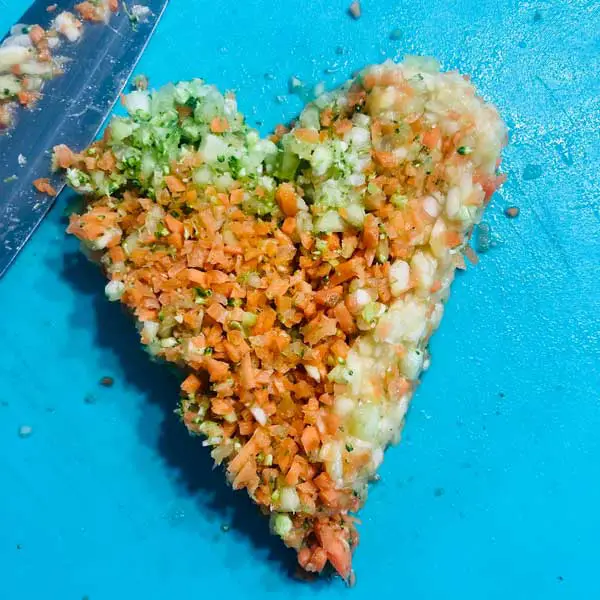
Lastly, serve your birds with the cucumber flesh fruit. You can chop it up into small pieces and put them in a small dish so your birds can choose when to eat them.
Alternatively, you can attach the cucumber to the food clip on their cage and let the budgies nimble it. Wouldn’t it be fun watching your birds nimble the cucumber like a wheel?
IMPORTANT: If your budgie eats to her satisfaction and leaves some bits of the cucumber, we advise you to remove the leftovers by the end of the day. This is an important practice, given that bacteria may grow on these leftovers after being left in the open for long hours.
Feeding your birds these leftovers the next day can make them sick. Give your budgies fresh fruit and fresh vegetables every time you want to treat them with fruits or veggies.
Can you feed cucumber to baby budgies?
You can feed cucumber to baby budgies as well. The small birds require essential vitamins and minerals, silicic acid for feathering, and water to stay hydrated, just like their parents. If it’s safe for the mother budgie, it’s most likely safe for the kids. This is the case for cucumbers which are safe for adult budgies.
However, you must ensure you prepare the cucumbers in a way that makes it easy for the young ones to enjoy. The preparation process is the same for adult birds, as outlined in our previous section.
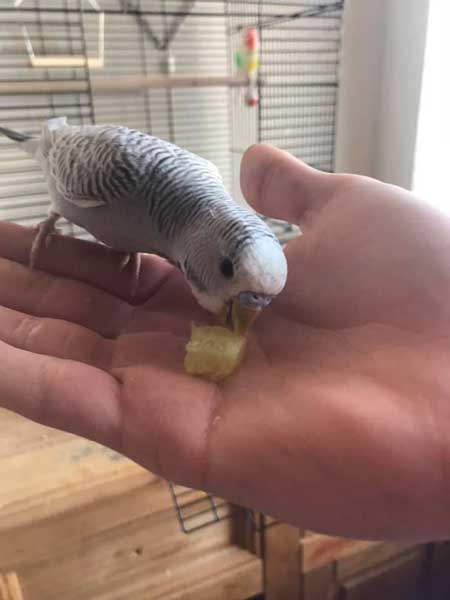
You want to ensure you get rid of the skin since it can be hard for the young ones to poke through it to get to the flesh. You should also ensure you get rid of all the seeds on the cucumber to avoid poisoning your bird.
And don’t forget to feed your baby budgies with cucumbers occasionally and moderately. Just like the adult budgies, the babies can suffer the same fate of watery stools if you provide them with too much cucumber.
Video Of a budgie eating cucumber
See the following video of a budgie enjoying a cucumber treat for lunch
Related questions (FAQ):
You should NOT feed cucumber seeds to your budgie. The seeds carry a component known as amygdalin, which can be toxic to the birds. Besides, the seeds may be too big for the birds to engulf, and the young baby budgies can easily choke on them. Get rid of all the seeds before feeding them to your little feather buddies.
Budgies can eat cucumber skin. But we discourage feeding it to them. While the wild budgies can easily poke through the cucumber skin and eat the flesh, your domesticated budgies may have it rough doing the same. This is especially true for baby budgies.
Still, at it, the cucumber skin may carry residual pesticides and fertilizers, which can prove toxic to their delicate system. Peeling is a sure way to eliminate all these risks and any fears you may have about your budgies getting sick from eating the cucumber skin.
Yes, they can.
Final Verdict
Cucumber is one of the safe fruits and vegetables to feed your budgies. This vegetable is packed with essential nutrients that your bird needs for continued growth and overall body health. These include crucial minerals and vitamins and silicic acid that promotes feathering. They are also quite hydrating for the birds.
But remember that you should only feed your feathered buddies with the flesh part of the cucumber. Avoid the seeds at all costs as they’re poisonous to the bird. You should also give the cucumber to the birds moderately; not more than twice weekly. This is important to prevent side effects of overfeeding, including runny droppings.
Do you know if your budgies can eat grapes or banana? Read our articles about it to learn more.
